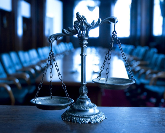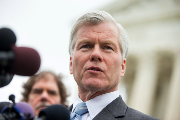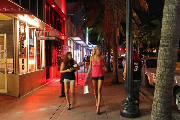Federal Fraud and Corruption Law and Cases
Federal prosecution of public corruption in the U.S.
Federal prosecution of public corruption in the United States
Wikipedia
Several statutes, mostly codified in Title 18 of the United States Code, provide for federal prosecution of public corruption in the United States. Federal prosecutions of public corruption under the Hobbs Act (enacted 1934), the mail and wire fraud statutes (enacted 1872), including the honest services fraud provision, the Travel Act (enacted 1961), and the Racketeer Influenced and Corrupt Organizations Act (RICO) (enacted 1970) began in the 1970s. "Although none of these statutes was enacted in order to prosecute official corruption, each has been interpreted to provide a means to do so."[1] The federal official bribery and gratuity statute, 18 U.S.C. § 201 (enacted 1962), the Foreign Corrupt Practices Act (FCPA) (enacted 1977), and the federal program bribery statute, 18 U.S.C. § 666 (enacted 1984) directly address public corruption.
The statutes differ in their jurisdictional elements, the mens rea that they require (for example, a quid pro quo or a nexus), the species of official actions that are cognizable, whether or not non-public official defendants can be prosecuted, and in the authorized sentence. The statutes most often used to prosecute public corruption are the Hobbs Act, Travel Act, RICO, the program bribery statute, and mail and wire fraud statutes.[2]
These statutes have been upheld as exercises of Congress's Commerce Clause power, or in the case of the mail fraud and program bribery statutes, the Postal Clause and the Spending Clause, respectively. In the special case where a member of Congress is the defendant, the Speech or Debate Clause places certain restrictions on the actions that can be prosecuted and proved up. Some commentators have argued that prosecutions of state and local officials under these statutes pose substantial federalism questions, while others argue that the Guarantee Clause provides additional authority for such prosecutions.
United States Department of Justice
Offices of United States Attorneys
Criminal Resource Manual 2001-2099
2041. Bribery Of Public Officials
Bribery of public officials and witnesses (PDF)
BRIBERY, GRAFT, AND CONFLICTS OF INTEREST (LII)
Federal Bribery Laws & Charges + Statute of Limitations
FederalCharges.com
18 U.S.C. § 201: Bribery of public
officials and witnesses
United States Office of Government Ethics
18 USC 201: Bribery of public
officials and witnesses
US Code - US House website
18 U.S. Code § 201 - Bribery of public o[...]
Adobe Acrobat document [52.7 KB]
18 U.S. Code Chapter 11 -
BRIBERY, GRAFT, AND CONFLICTS OF INTEREST (LII)
Supreme Court tosses conviction of former Virginia governor, clarifies reach of bribery law
Supreme Court tosses conviction of former Virginia governor, clarifies reach of bribery
law
ABA Journal Daily News
By Debra Cassens Weiss
Posted Jun 27, 2016 09:37 am CDT
The U.S. Supreme Court has overturned the conviction of former Virginia Gov. Robert McDonnell in a decision interpreting the meaning of "official action" in the federal bribery law.
The decision (PDF) was unanimous. In his opinion for the court, Chief Justice John G. Roberts Jr. said jurors received faulty instructions on the meaning of the law that would reach conduct by government officials that is not unlawful.
The instructions were based on the government’s "boundless interpretation" of the federal bribery law that raised constitutional concerns, Roberts said. The government interpretation "could cast a pall of potential prosecution" on routine courtesies extended to constituents who have previously made a campaign donation or treated a government official to a sports outing, Roberts said.
McDonnell and his wife were accused of accepting $175,000 in loans, gifts and benefits from a businessman promoting a diet supplement. McDonnell had argued his favors for the businessman were not the kind of "official acts" that are barred.
McDonnell, who was first elected to the post of governor in 2010 as a Republican, said his actions were no more than "routine political courtesies" such as arranging meetings; hosting events at the governor’s mansion; and contacting government officials about studies of the supplement. The Supreme Court agreed that such actions, by themselves, don’t qualify as an "official action" that is barred when done in exchange for something of value.
McDonnell was accused of honest-services fraud and Hobbs Act extortion on a theory that he had accepted bribes, and he agreed to reference the federal bribery statute and its definition of "official act." As a result, the government had to prove McDonnell committed or agreed to commit an official act in exchange for loans and gifts from the businessman, Jonnie Williams, CEO of the supplement company Star Scientific.
The district court advised the jury on the meaning of "official act" using the government’s definition. The district court said the term includes "acts that a public official customarily performs," including acts "in furtherance of longer-term goals" or "in a series of steps to exercise influence or achieve an end." Jurors convicted McDonnell on the Hobbs Act and honest-services fraud charges.
Siding with McDonnell, the Supreme Court said the government’s interpretation of the law was too expansive. An official act, Roberts wrote, is a decision or action on a matter that involves a formal exercise of governmental power that is similar to a lawsuit before a court, a determination before an agency, or a hearing before a committee. The public official must make a decision or take an action on that matter, or agree to do so, for it to be an official act.
Setting up a meeting, calling another public official or hosting an event does not, standing alone, qualify as an official act, Roberts said.
"Conscientious public officials arrange meetings for constituents, contact other officials on their behalf, and include them in events all the time," Roberts wrote. "The basic compact underlying representative government assumes that public officials will hear from their constituents and act appropriately on their concerns—whether it is the union official worried about a plant closing or the homeowners who wonder why it took five days to restore power to their neighborhood after a storm.
"The government’s position could cast a pall of potential prosecution over these relationships if the union had given a campaign contribution in the past or the homeowners invited the official to join them on their annual outing to the ballgame. Officials might wonder whether they could respond to even the most commonplace requests for assistance, and citizens with legitimate concerns might shrink from participating in democratic discourse."
Because jurors received incorrect jury instructions, they may have convicted McDonnell for conduct that isn’t unlawful, Roberts said.
On remand, the court said, a federal appeals court should determine whether there is sufficient evidence for a jury to convict McDonnell of committing or agreeing to commit an official act. If so, the case should be set for retrial with new jury instructions.
McDonnell had also argued that the bribery and extortion laws should be struck down as unconstitutionally vague. Roberts said the court’s opinion construes "official act" to avoid vagueness concerns, and "we decline to invalidate those statues under the facts here."
Roberts began the opinion with a description of the gifts and favors bestowed upon McDonnell and his wife, Maureen. They included $20,000 in designer clothing for Maureen McDonnell; three loans totaling $120,000; $15,000 to help pay for the wedding of the couple’s daughter; a visit to Williams’ vacation home in which McDonnell borrowed Williams’ Ferrari; a $10,000 wedding gift for one of the couple’s daughters; and a Rolex watch that Maureen McDonnell gave to her husband as a Christmas gift.
Roberts continued with the theme at the conclusion of his opinion.
"There is no doubt that this case is distasteful; it may be worse than that," Roberts wrote. "But our concern is not with tawdry tales of Ferraris, Rolexes, and ball gowns. It is instead with the broader legal implications of the government’s boundless interpretation of the federal bribery statute. A more limited interpretation of the term ‘official act’ leaves ample room for prosecuting corruption, while comporting with the text of the statute and the precedent of this court." Read more
McDonnell v United States, No. 15-474 - October Term, 2015
Argued April 27, 2016 - Decided June 27, 2016
The case is McDonnell v. United States (PDF opinion)
McDonnell v. United States SCOTUS Blog
McDonnell v. United States SCOTUS Docket 15-474
McDonnell v. United States Oyez IIT Chicago-Kent College of law
McDonnell-v-United-States.pdf
Adobe Acrobat document [157.6 KB]
Supreme Court Spares Ex-Virginia Gov. Bob McDonnell From Prison
The Huffington Post
By Cristian Farias
Legal Affairs Reporter
The justices ruled that federal prosecutors overreached when going after the former governor for corruption.
WASHINGTON — The Supreme Court on Monday gave former Virginia Gov. Bob McDonnell (R) the reprieve of his life — reversing his multiple convictions for corruption and effectively sparing him from federal prison.
McDonnell had been fighting since last summer for the high court to get involved in his case, and a major stroke of luck came in January, when the justices granted him a rare opportunity to not turn himself in until they issued a final ruling.
When the court finally heard the merits of McDonnell’s appeal, he seemed to have gotten lucky yet again, with a clear Supreme Court majority expressing deep skepticism over the way the federal government handled his criminal prosecution — which included a high-profile trial that convicted him and his wife Maureen for receiving lavish gifts in exchange for favors for a pharmaceutical businessman.
In a unanimous ruling authored by Chief Justice John Roberts, the court noted the many indiscretions that led up to McDonnell’s prosecution, while leaving open the possibility for a new trial for the former governor.
"There is no doubt that this case is distasteful; it may be worse than that," Roberts wrote. "But our concern is not with tawdry tales of Ferraris, Rolexes, and ball gowns. It is instead with the broader legal implications of the Government’s boundless interpretation of the federal bribery statute."
At the crux of the case was the question of what kind of behavior by elected officials counts as an "official act" under federal anti-corruption laws, which prohibit quid pro quo corruption — or the exchange of something of value for government favor. McDonnel, aided by a coalition of legal scholars, former government officials and defense attorneys, had contended that his actions didn’t qualify, and urged the justices not to settle for a definition that sweeps too broadly and punishes otherwise innocent everyday political activity.
The Supreme Court on Monday largely agreed, relying on the text of federal law, its own precedents and constitutional principles "to adopt a more bounded" reading of what "official act" means.
"Under that interpretation, setting up a meeting, calling another public official, or hosting an event does not, standing alone, qualify as an ‘official act,’" Roberts wrote.
The chief justice explained that something more was required — specifically, "a decision or action on a question, matter, cause, suit, proceeding or controversy," which in turn "must involve a formal exercise of governmental power" or use one’s position to "exert pressure on another official to perform an official act."
Pointing to a brief from former White House attorneys who served under both Republican and Democratic presidents, Roberts also noted that the government’s proposed reading would lead to a "breathtaking expansion of public-corruption law" that "would likely chill federal officials’ interactions with the people they serve and thus damage their ability effectively to perform their duties."
Given these and other constitutional concerns, Roberts concluded that the jury that convicted McDonnell wasn’t properly instructed and that its determinations should be vacated, leaving it to an appeals court to determine whether the case should be set for a new trial or the charges dismissed altogether.
And in a sort of nod to federal prosecutors — such as Preet Bharara, who has risen to prominence in recent years for going after top elected officials in New York — Roberts seemed to alleviate fears that the ruling might be read to give a boon to corrupt politicians.
"A more limited interpretation of the term ‘official act’ leaves ample room for prosecuting corruption, while comporting with the text of the statute and the precedent of this Court," he wrote.
In a statement, McDonnell thanked God, the court and his legal team for Monday’s result, and expressed hope that this legal ordeal will soon be over.
"From the outset, I strongly asserted my innocence before God and under the law," he said. "I have not, and would not, betray the sacred trust the people of Virginia bestowed upon me during 22 years in elected office." Read more
Mail and wire fraud - 18 USC ss 1341, 1343, 1346
Mail and wire fraud
Wikipedia
In the United States, mail and wire fraud is any fraudulent scheme to intentionally deprive another of property or honest services via mail or wire communication. It has been a federal crime in the United States since 1872.
Whoever, having devised or intending to devise any scheme or artifice to defraud, or for obtaining money or property by means of false or fraudulent pretenses, representations, or promises, or to sell, dispose of, loan, exchange, alter, give away, distribute, supply, or furnish or procure for unlawful use any counterfeit or spurious coin, obligation, security, or other article, or anything represented to be or intimated or held out to be such counterfeit or spurious article, for the purpose of executing such scheme or artifice or attempting so to do, places in any post office or authorized depository for mail matter, any matter or thing whatever to be sent or delivered by the Postal Service, or deposits or causes to be deposited any matter or thing whatever to be sent or delivered by any private or commercial interstate carrier, or takes or receives therefrom, any such matter or thing, or knowingly causes to be delivered by mail or such carrier according to the direction thereon, or at the place at which it is directed to be delivered by the person to whom it is addressed, any such matter or thing, shall be fined under this title or imprisoned not more than 20 years, or both. If the violation occurs in relation to, or involving any benefit authorized, transported, transmitted, transferred, disbursed, or paid in connection with, a Presidential declared major disaster or emergency (as those terms are defined in section 102 of the Robert T. Stafford Disaster Relief and Emergency Assistance Act (42 U.S.C. 5122)), or affects a financial institution, such person shall be fined not more than $1,000,000 or imprisoned not more than 30 years, or both.[1]
Wire
Whoever, having devised or intending to devise any scheme or artifice to defraud, or for obtaining money or property by means of false or fraudulent pretenses, representations, or promises, transmits or causes to be transmitted by means of wire, radio, or television communication in interstate or foreign commerce, any writings, signs, signals, pictures, or sounds for the purpose of executing such scheme or artifice, shall be fined under this title or imprisoned not more than 20 years, or both. If the violation affects a financial institution, such person shall be fined not more than $1,000,000 or imprisoned not more than 30 years, or both.[2]
Honest services
Main article: Honest services fraud
For the purposes of this chapter, the term "scheme or artifice to defraud" includes a scheme or artifice to deprive another of the intangible right of honest services.[3]
Elements
There are three elements to mail and wire fraud:
- Intent;
- A "scheme or artifice to defraud" or the obtaining of property by fraud; and,
- A mail or wire communication.[4]
To be fraudulent, a misrepresentation must be material.[5]
Mail fraud applies only to United States domestic mailings and use of interstate carriers (UPS, FedEx) which must originate in one state, and successfully terminate pursuant to the address label inside another state, a transportation that is termed "interstate" (over which Congress has power to regulate) and does require that the mailing cross at least one state line into another state; wire fraud has been expanded by Congress to include foreign wire communication or interstate connections via (e.g.) an e-mail server or telephone switch or radio communication.[6]
Case law
In McNally v. United States (1987), the Supreme Court held that 18 U.S.C. §§ 1341 and 1343 did not reach "honest services fraud".[7] Congress responded by passing 18 U.S.C. § 1346. In Skilling v. United States (2010), the Court construed § 1346 to apply only to bribes and kickbacks.[8]
Mail fraud schemes
There are many types of mail fraud schemes, including employment fraud, financial fraud, fraud against older Americans, sweepstakes and lottery fraud, and telemarketing fraud. Additional information about these various types of mail fraud schemes can be found on the United States Postal Inspection Service website.
In the 1960s and 1970s, Chief Postal Inspector Martin McGee, also known as "The Top Sleuth" or "Mr. Mail Fraud", led his department in exposing and prosecuting numerous mail fraud swindles such as land sales, phony advertising practices, insurance ripoffs, and fraudulent charitable organizations using the mail.[9]
Abuse and overcriminalization
18 U.S.C. §1341 and 18 U.S.C. §1343 are extremely broad, criminalizing every "scheme to defraud" that "causes" mails to be used at any incidental stage.[10] This has been held by the Supreme Court to encompass "everything designed to defraud by representations as to the past or present, or suggestions and promises as to the future."[11] Lower courts have progressively expanded this ruling, finding that the act "puts its imprimatur on the accepted moral standards and condemns conduct which fails to match the 'reflection of moral uprightness, of fundamental honesty, fair play and right dealing in the general and business life of members of society'".[12] As interpreted, these requirements are not difficult to meet, and while the Justice Department claims to defer federal prosecution for petty local fraud, no legal mechanism prevents abuse of this limitation.[13] As a result, seemingly innocent acts are prosecuted as federal crimes.
See also
Email authentication
List of confidence tricks
Making false statements
Patriot Act
Travel Act
Taylor, Bean & Whitaker, top-10 U.S. wholesale mortgage lending firm that ceased business
following multibillion-dollar fraud revelations
11th Circuit references Vulcans and bourbon in tossing convictions in alleged 'bar girls' scheme
11th Circuit references Vulcans and bourbon in tossing
convictions in alleged 'bar girls' scheme
ABA Journal Daily News
By Debra Cassens Weiss
Posted Jul 13, 2016 07:30 am CDT
In a colorfully written opinion, a federal appeals court has tossed the convictions of nightclub operators accused of using enticing "bar girls" to lure drunken customers to pay tens of thousands of dollars for overpriced drinks.
The Atlanta-based 11th U.S. Circuit Court of Appeals said jurors should have been instructed to acquit the defendants if the "bar girls" tricked the victims into entering the bars, yet gave the victims exactly what they asked for and charged them exactly what they agreed to pay. The defendants were charged under the wire-fraud statute banning any "scheme or artifice to defraud."
In making its point, the July 11 opinion (PDF) by U.S. District Judge Amul Thapar referenced Pappy’s bourbon, Vulcans, Casablanca and Moses. Thapar is a federal judge in Kentucky sitting by designation. The Miami Herald, Above the Law and the Southern District of Florida Blog have stories.
The opinion begins this way: "The wire-fraud statute, 18 U.S.C. § 1343, does not enact as federal law the Ninth Commandment given to Moses on Sinai. For § 1343 forbids only schemes to defraud, not schemes to do other wicked things, e.g., schemes to lie, trick, or otherwise deceive." (A footnote explains the Ninth Commandment is "Thou shalt not bear false witness against thy neighbor.")
The defendants had offered a "Casablanca defense," Thapar wrote, "arguing they were ‘shocked, shocked’ to learn that fraud was taking place within their South-Beach versions of Rick’s Café Americain. … In the defendants’ story, none of these allegedly swindled men were truly victims: they knowingly entered the clubs, bought bottles of liquor, and drank them with their female companions. Thus, in the defendants’ view, these men got what they paid for—nothing more, nothing less."
The "bar girls" had posed as tourists to lure the victims to the defendants’ nightclubs without disclosing that they were employees of the defendants. The government had argued that concealing their bar affiliation was itself sufficient to constitute fraud.
Thapar disagreed with the government, and offered this example: "Now imagine another, more common scenario: a young woman asks a rich businessman to buy her a drink at Bob’s Bar. The businessman buys the drink, and afterwards the young woman decides to leave. Did the man get what he bargained for? Yes. He received his drink, and he had the opportunity to buy a young woman a drink. Does it change things if the woman is Bob’s sister and he paid her to recruit customers? No; regardless of Bob’s relationship with the woman, the businessman got exactly what he bargained for. If, on the other hand, Bob promised to pour the man a glass of Pappy Van Winkle but gave him a slug of Old Crow instead, well, that would be fraud. Why? Because the misrepresentation goes to the value of the bargain."
Thapar included footnotes explaining that Pappy’s is a rare bourbon that is nearly impossible to find and afford, while Old Crow retails for about $15 a bottle.
Thapar referenced Star Trek in a portion of the opinion considering whether an instruction given to jurors had sufficed. He said it had not. "After all, the average juror is not Mr. Spock," Thapar said. "If he were, then a trial-court judge’s job would be much easier. He could instruct the jury in broad strokes—instructing only as to the bare elements of the crime, perhaps—and be confident that the jury would deduce all of the finer-grained implications that must logically follow. As it stands, however, the vast majority of American juries are composed exclusively of humans. And humans, unlike Vulcans, sometimes need a bit more guidance as to exactly what the court’s instructions logically entail."
The ruling completely overturned the conviction of Isaac Feldman, overturned the fraud conviction of Albert Takhalov, and overturned conspiracy and fraud charges against Stanislav Pavlenko, the Miami Herald explains. A fourth defendant was acquitted at trial and 14 others pleaded guilty. Read more
USA v Albert Takhalov et al, CA11 Case 1[...]
Adobe Acrobat document [210.5 KB]
B-Girls convictions reversed with citations to the Bible, Vulcans and Pappy's Bourbon
Southern District of Florida blog
Monday, July 11, 2016
Wow, big opinion today by the 11th Circuit, reversing the B-girls convictions. The blog covered (and frequently criticized) the prosecution and lengthy trial, which involved bar girls getting guys drunk and running up tabs at bars. Welcome to Miami!
The 11th Circuit held that the court should have instructed the jury as follows: that they must acquit if they found that the defendants had tricked the victims into entering a transaction but nevertheless gave the victims exactly what they asked for and charged them exactly what they agreed to pay.
The panel was Ed Carnes, Martin and visiting district judge Amul Thapar (EDKY).
The appellate defense team included Howard Srebnick, Richard Klugh, Marcia Silvers, and John Bergendahl.
The opinion, written by Judge Thapar, is awesome and includes all sorts of fun references (to the Bible, Star Trek, Whiskey, Holmes and more). Here's the intro:
The wire-fraud statute, 18 U.S.C. § 1343 does not enact as federal law the Ninth Commandment given to Moses on Sinai.* For § 1343 forbids only schemes to defraud, not schemes to do other wicked things, e.g., schemes to lie, trick, or otherwise deceive. The difference, of course, is that deceiving does not always involve harming another person; defrauding does. That a defendant merely “induce[d] [the victim] to enter into [a] transaction” that he otherwise would have avoided is therefore “insufficient” to show wire fraud. See United States v. Starr, 816 F.2d 94, 98 (2d Cir. 1987).
Here, the defendants feared that the jury might convict them of wire fraud based on “fraudulent inducements” alone. Hence they asked the district court to give the jurors
the following instruction: that they must acquit if they found that the defendants had tricked the victims into entering a transaction but nevertheless gave the victims exactly what they asked for
and charged them exactly what they agreed to pay. The district court refused to give that instruction, and the jury ultimately convicted the defendants of wire fraud and other crimes, most of which
were predicated on the wire-fraud convictions. The question presented in this appeal is whether the district court abused its discretion when it refused to give the requested instruction.
*See Exodus 20:16 ("Thou shalt not bear false witness against thy neighbor.") (KJV).
Some other good stuff:
- The question before us, however, is not whether the proposed instruction was "logically entailed" by the given instruction, but whether it was "substantially covered"; and those are meaningfully different concepts. After all, the average juror is not Mr. Spock. If he were, then a trial-court judge’s job would be much easier. He could instruct the jury in broad strokes—instructing only as to the bare elements of the crime, perhaps—and be confident that the jury would deduce all of the finer-grained implications that must logically follow. As it stands, however, the vast majority of American juries are composed exclusively of humans. And humans, unlike Vulcans, sometimes need a bit more guidance as to exactly what the court’s instructions logically entail.
- Now imagine another, more common scenario: a young woman asks a rich businessman to buy her a drink at Bob’s Bar. The businessman buys the drink, and afterwards the young woman decides to leave. Did the man get what he bargained for? Yes. He received his drink, and he had the opportunity to buy a young woman a drink. Does it change things if the woman is Bob’s sister and he paid her to recruit customers? No; regardless of Bob’s relationship with the woman, the businessman got exactly what he bargained for. If, on the other hand, Bob promised to pour the man a glass of Pappy Van Winkle** but gave him a slug of Old Crow*** instead, well, that would be fraud. Why? Because the misrepresentation goes to the value of the bargain.
** "Pappy’s," as it is often called, is a particularly rare bourbon varietal: nearly impossible to find, and nearly impossible to afford when one finds it.
***Although Old Crow has a venerable pedigree—reportedly the go-to drink of Mark Twain, Ulysses S. Grant, Hunter Thompson, and Henry Clay—it is not Kentucky’s most-expensive liquor. Its "deluxe" version, "Old Crow Reserve," retails for approximately $15 per bottle.
Thus, a "scheme to defraud," as that phrase is used in the wire-fraud statute, refers only to those schemes in which a defendant lies about the nature of the bargain itself. That lie can take two primary forms: the defendant might lie about the price (e.g., if he promises that a good costs $10 when it in fact costs $20) or he might lie about the characteristics of the good (e.g., if he promises that a gemstone is a diamond when it is in fact a cubic zirconium). In each case, the defendant has lied about the nature of the bargain and thus in both cases the defendant has committed wire fraud. But if a defendant lies about something else—e.g., if he says that he is the long-lost cousin of a prospective buyer—then he has not lied about the nature of the bargain, has not "schemed to defraud," and cannot be convicted of wire fraud on the basis of that lie alone.
- Similarly, in Hill, the court instructed the jury that the defendant was guilty of credit-application fraud only if he made false statements to the bank knowingly and willfully. The defendant asked the court to instruct the jury that he was not guilty if he believed the statements were true. United States v. Hill, 643 F.3d 807, 852–54 (11th Cir. 2011). Thus, to get from the given instruction to the requested one, the jury needed to infer only one thing: that a person cannot lie "knowingly and willfully" if he speaks what is in his view the truth. That inference, too, hardly requires Holmesian feats of deduction.****
****Sherlock or Oliver Wendell: either Holmes will do here.
This is just some of the really fun stuff in the opinion. Read more
USA v Takhalov et al, CA11 No 13-12385
Appeals court throws out Miami Beach ‘bar-girl’ convictions
Miami Herald
By Jay Weaver
jweaver@miamiherald.com
July 11, 2016 7:07 PM
The beguiling "bar girls" lured a TV weatherman and other easy marks into private nightclubs on Miami Beach, where they ran up hundreds of thousands of dollars in bills on their credit cards for fancy bottles of Dom Perignon and Russian vodka.
The girls, recruited from Eastern Europe by the club owners, testified they picked up the patrons in luxury hotels like the Delano and plied them with overpriced drinks at the seven South Beach venues. The girls said they got the out-of-town visitors so drunk that the men complained they couldn’t even remember signing their credit card slips.
But in a stunning ruling issued Monday, a federal appeals court panel found that the fraud convictions of two club operators should be thrown out because the presiding judge made a fatal mistake in his jury instructions at their 2012 trial. The panel’s ruling hinged on a legal interpretation of whether the victims were deceived or defrauded.
The panel, based in Atlanta, ruled that U.S. District Judge Robert Scola should have granted the defense request for the following jury instruction: the jurors "must acquit if they found that the defendants had tricked the victims into entering a transaction but nevertheless gave [them] exactly what they asked for and charged them exactly what they agreed to pay."
The ruling by the 11th Circuit Court of Appeals panel was striking, mainly because the Miami federal trial lasted nearly three months and 14 of the 18 defendants pleaded guilty before or during the proceeding. The panel’s ruling — which was peppered with colorful references to Moses, Star Trek, the movie "Casablanca," Kentucky whiskey, Oliver Wendell Holmes and Sherlock Holmes — did not affect those who cut plea deals, including the ringleader.
The U.S. Attorney’s Office declined to comment on the three-judge panel’s unanimous ruling that Scola "abused [his] discretion by refusing to give that instruction." But it is likely federal prosecutors will ask the entire appeals court to rehear the case.
That means that the two defendants completely cleared of fraud offenses might still remain in prison during a possible appeal:
- Investor Isaac Feldman, a once prominent Sunny Isles Beach real estate broker, invested in the ring’s Stars and VIP lounges on South Beach. Feldman, represented by the late attorney, Myles Malman, was sentenced to more than eight years in prison. His conviction was completely overturned by the appeals court.
- Albert Takhalov, who managed credit card transactions, received the stiffest sentence because he played a key role at five of the illicit clubs (VIP, Stars, Tangia, Nowhere Bar and Moreno) throughout the duration of the scheme from 2010-11. Takhalov was sentenced to 12 years. His fraud conviction was reversed, though an immigration violation still stands.
"This is a clear victory for Albert Takhalov today," said his attorney, Albert Levin.
- The ruling also could impact a third defendant: Stanislav Pavlenko, who managed credit-card transactions at one of the ring's Washington Avenue clubs, Caviar Bar. Pavlenko was sentenced to 6 1/2 years in prison. His conspiracy and other fraud charges were vacated. But a remaining fraud count still stands because Pavlenko wrote a letter to AMEX disputing the TV weatherman’s complaint about his bloated credit card bill.
His attorney, Roderick Vereen, was still pleased: "This ruling should help reduce his sentence."
A fourth defendant, Siavash Zargari, who did business with Takhalov, was acquitted at trial.
All lived in the Aventura, Sunny Isles Beach and Miami Beach areas before their so-called B-girl network was busted by the FBI in April 2011.
At trial, the defendants’ attorneys asked Judge Scola to include this specific jury instruction: that "failure to disclose the financial arrangement between the B-girls and the bar, in and of itself, is not sufficient to convict a defendant of any offense." But Scola refused to include it.
"In sum, the defendants asked the [judge] to tell the jurors that they could convict only if they found that the defendants had schemed to lie about the quality or price of the goods sold to the victims," wrote Judge Amul Thapar, of the federal appeals panel. The panel concluded that the instruction was a "correct statement of the law" and "dealt with a sufficiently important point raised during the trial."
In 2012, the jury reached its guilty verdicts on a variety of conspiracy, wire fraud and money-laundering charges after a long trial filled with tales about Miami Beach's underground bar scene. The jury also issued acquittals on numerous wire fraud offenses involving credit card transactions.
The 12-person jury heard testimony from Alec "Oleg" Simchuk, the admitted Russian mobster who organized the racket; a few bar girls who lured the male customers from swank hotels like the Delano to the private bars; the former TV weatherman who was taken for $43,000 over two nights; and an undercover Miami Beach police officer who posed as a dirty cop and worked as a bouncer for the clubs while recording the illicit activity.
The puppet master behind the scam: Simchuk, a Russian native and naturalized U.S. citizen who testified about his partners and associates.
Simchuk, who pleaded guilty before trial, testified that he modeled the South Beach clubs after his former bars in Latvia and Estonia. He said he illegally brought many of the same young women who had worked for him there to South Florida. Read more
Three Convicted, One Acquitted in South Beach B-Girl Booze Scheme
NBC 6 South NBCMiami
The scam cost customers between $400,000 and $1 million, officials say.
A Miami federal jury on Thursday convicted three of four men accused of running a ring of girls who swindled men at South Beach clubs.
Stanislav Pavlenko, Albert Takhalov and Isaac Feldman were convicted of stealing money from dozens of male customers by billing them bogus charges for champagne, vodka and caviar on their credit cards at clubs, the Miami Herald reports.
A fourth defendant, Siavash Zargari, was acquitted.
Man Arrested at Miami Airport for Role in 'B-Girls' Scheme: FBI
Among those who provided testimony in the case was a former Philadelphia TV weatherman who was taken for $43,000 over two nights, the newspaper said. The weatherman, John Bolaris, described the women as "the kind of girls you’d like to marry." They tricked him into buying a painting at a bar for $2,480, the Miami Herald reported.
17 Charged in South Beach B-Girl Booze Scheme
Another defendant, Alec Simchuk, pleaded guilty before trial and in October testified about his partners and associates.
In his plea agreement, he said his group ran up phony bills for booze, wine and champagne on the credit cards of male tourists, the newspaper reported. The scam cost customers between $400,000 and $1 million, according to the plea agreement.
More than a dozen suspects were charged last year in the scheme, and most of them have since pleaded guilty. Federal officials said the so-called B-Girls generally got a 20 percent take of the exorbitant bills while club owners got 10 percent. Read more








































































































































